JFB & Sia talk about Music, Sex, and GOOD BOY
- by Jennifer BoylanSia and I talk about men, women, and dogs. Watch the crazy talk here.
Belgrade Lakes: A Love Story
- by Jennifer BoylanA local’s tour of the Belgrade Lakes region in Maine, and a heartfelt ode to living where others vacation.
What “Peanuts” Taught Me About Queer Identity
- by Jennifer BoylanThe comic strip’s lessons about unrequited love and self-acceptance.
A Tribute to Richard Russo
- by Jennifer BoylanOn October 20, 2018, the F. Scott Fitzgerald Festival honored my longtime friend, author Richard Russo. I was asked to make the introduction, and to talk about Rick’s work, as well as our friendship. The following is the text from that speech.
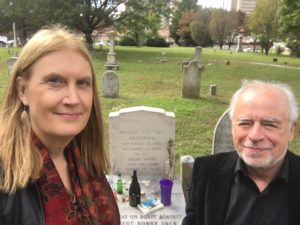
Jenny Boylan and Richard Russo at the grave of F. Scott and Zelda Fitzgerald, 10/20/18
Good afternoon. It’s an honor to speak with you today about my friend Richard Russo.
To you, he is the distinguished author of over a dozen books, winner of the Pulitzer Prize, and today’s honoree at the Fitzgerald Festival.
But to me, he’s a friend of over 25 years. And when I think of Rick, the very first thing that comes to mind, in fact, is his cry of sheer terror as he approached the edge of the giant flume in Splash Mountain down in Disney World. This was in Orlando, in a vacation that our families took many years ago. On Splash Mountain—well some of you have been there–, we repeatedly hear an audio-animatronic Brer Rabbit saying to his arch nemesis, Brer Fox, “Let me take you to the Laughin’ Place.” He keeps saying it, as our log-canoes bob and weave through the rushing waters of the ride. “Come on. Let me take you to the laughin’ place.” Rick and I, who have spent many nights in what our spouses Deedie and Barb might euphemistically describe as a laughin place all our own, looked at each other as we approached the final, terrifying waterfall and its ensuing 100 foot drop off into thin air, and then, as we went off the edge, screamed our brains out. When we emerged a little later, soaked to the skin, we were greeted by Brer Rabbit once again, who noted, “I didn’t say it was your laughin place, Brer Fox, I said it was MY laughin place.”
And that’s I think of when I think of Rick Russo, the author—going to the laughin place. His books are literary, smart, painful, sometimes terrifying—but above all, they are funny. Rick’s humor isn’t the easy kind of humor, either, the humor of cruelty, irony, and fart jokes—not that he’d rule out a fart joke, now and again, if the dramatic situation made it absolutely necessary. But Rick’s humor is generous, and forgiving, and quite often right on the edge of something else—sadness, loss, fear. When Rick takes you to his Laughin Place, he’s taking you to a place of truth—a place where you have to laugh because the alternatives are too scary, or too sad.
Over the years, my friend has shown me, and my family, exactly how serious it is, to go to the laughin place.
Our friendship has been tested lots of times, by struggles of our children; by the loss of friends; by the arcane demands of the teaching profession; and by the many highs and lows in the lives of working authors. But most of all, our friendship was tested in 2000, when I came out as transgender. Rick has written elsewhere that all of his important relationships are with women, but that none of those relationships are easy. I think, back in the days of our male friendship, that he felt that in me he’d finally found one relationship that would be uncomplicated.
But in this, he turned out to be disappointed. This time, it was my turn to take us to the laughin’ place—a place of that contained, as always, equal measures of joy and of tears.
At the end of my own transition, I wrote Rick an email thanking him for his steadfastness and his love. He wrote back immediately with the following email:
Boylan – I have always known and never doubted that if I called you, you’d be right there. I had no idea you’d show up in heels, but that’s hardly the point.
Maybe it’s no surprise that humor, mixed with sadness, has been a constant in our friendship, given that it’s a constant in his fiction as well. By that same logic, you might not be surprised by the other constant in the lives of Boylans and Russos, since it too is present in all his books—and that constant is food.
Rick Russo is celebrated for many things—his writing, his good works, his service to the Authors Guild. But what you may not know is that Rick is the best cook I have ever known. If I think about him, the first thing that pops into my mind is—well, like I said, him screaming as we plunged down Splash Mountain– but right after that, I think of the many evenings at his house, with Rick in the kitchen. Mahogany clams. Pork tenderloin. Pizzas fired on the grill. Leg of lamb with garlic and mint. Giant bowls full of noodles and seafood. It was from Rick Russo that I learned how to save the shells of lobsters and put them in a bowl of simmering tomato sauce to give that sauce the warm salty tang of the ocean. It was from Rick Russo that I learned how to make a perfect martini—stirred, not shaken. It was from Rick Russo that I learned to make filet mignon by searing it briefly in a cast iron pan and then sticking the whole pan in a hot oven. And to then serve that steak with a big square of Irish creamery butter melting over the top. It was from Rick Russo that I learned the delights of what writers in maine simply call the Russo aperitif course—the moment at the end of a long dinner when he brings out the tiny glasses for port, or single malt scotch, or pardon the expression, Bailey’s Irish Cream.
It has been a long time since my friend was an altar boy in Gloversville, New York,and it’s been even longer than thatsince the Boylans have had a relationship with the Catholic church, since my own father left the faith in adolescence. But writing of his upbringing this summer, in a piece on the work of Andre Dubus, Rick said, “ though I’ve successfully flushed most Catholic doctrine from my system, the vocabulary of my former faith—sin, redemption, grace—obstinately remains.
I miss how warm the church of my youth had been in winter, how cool and dry in summer. The smell of incense, the tinkling of the bell at communion, the sense of an entire community humble in the face of mystery—these were the soothing rituals that nonbelievers throw out with the doctrinal bath water.
I mention this because something of the rituals of an evening around the Russo’s dinner table—the drinks, the appetizer, the main course, the dessert and the apertifs, all accompanied by laughter, and story—these put me in mind of another Catholic ritual—the eucharist, the breaking of bread and the drinking of wine as symbols of life, and of redemption.
When I was in college, I once went to a mass on a Sunday morning in which the campus priest suggested that this was why we drank beer and ate pizza in our dormitories. It wasn’t only because we were hungry. It was because there was something in the ritual of sharing food and drink that reminds us of the joys—and the sorrows—of being human, joys and sorrows that can only be appreciated in communion with other souls.
If there’s any single unifying theme in Rick’s work, I would suggest it’s not that its characters are all working class men and women in the rust belt—although sure, there’s that. But more important to me is the fact that in almost every one of his books, there are people sharing food in a way that is generous and sustaining. In the very first scene of his very first novel, Mohawk, we meet a chef named Harry, who is opening up the Mohawk Grill, where he meets the town’s lost soul, Wild Bill. Harry sets Wild Bill upon a stool and sets about making him eggs and sausages and toast, in an act that, depending on how you look at it, is either totally commonplace, or the work of a saint.
There are other diners, too, of course—Hattie’s Lunch in Nobody’s Fool; and the Empire Grill in Empire Falls. In his books, as in our lives together, a lot of the most important things have taken place around a table. When we read Rick’s work, we are being reminded of what it is to hunger, to desire, and also what it is to be filled.
My favorite one of these scenes takes place about halfway through Rick’s novel Straight Man, when two characters are gathered, of course, in a restaurant. One, named Tony, has ordered a healthy dish of trout. Our hero, hank, meanwhile, has ordered the prime rib. “I’m astonished,” Hank says, “to discover that I have an excellent appetite for my prime rib, which has arrived sweet and bloody. Tony picks up his trout then finally asks if he can have a taste of my dinner. When I start to carve off a portion, he stops me. “Just the fat,” he explains, leaning over to take the piece he wants from the tail. He chews it with something a kin to religious ecstasy.
That chapter then ends with the single observation: we do not want what is good for us.
That line—teetering between irony and truth, between comedy and sorrow—delivered between two people sharing a meal, in a ritual which makes clear the love they have for one another—well, to me that’s Rick Russo, dropping us all off the edge, leading us, once again, to the laughin place, the most serious place on earth.
I’m delighted that you’ve chosen to give rick the Fitzgerald award this year. I know that there are many writers—young and old—in the audience, and I hope that you will find in your lives what I have found in mine—love, inspiration, and most of all, the shared feast of friendship. There have been times when, in thinking of my friend, I think of the relationship between another mismatched pair, Charlotte the spider, and Wilbur the pig. In Charlotte’s Web, the spider—that’s me—looks to the pig—that’s russo—and says,
“You have been my friend. That in itself is a tremendous thing. I wove my webs for you because I liked you. After all, what’s a life, anyway? We’re born, we live a little while, we die. A spider’s life can’t help being something of a mess, with all this trapping and eating flies. In our friendship, you lifted up my life a trifle. Heaven knows anyone’s life can stand a little of that.”
Later, after she’s gone, Wilbur—the pig—thinks of the life he has lived:
It was the best place to be, thought Wilbur, this warm delicious celler with the garrulous geese; the changing seasons, the heat of the sun, the passage of swallows, the nearness of rats, the sameness of sheep, the love of spiders, the smell of manure, and the glory of everything. It is not often you have a good friend who is also a great writer. Charlotte—by which I mean Russo– was both.
Ladies and gentlemen, a great American writer, a national treasure, and a really good cook. My friend, Richard Russo.
Feeling Blue? Folks at the December Project want to cheer you.
- by Jennifer Boylan This year, because US politics have become so acrimonious, Helen Boyd and Dylan Scholinski decided to bring back The December Project – the brainchild of Jenny Boylan, who understood how many of us are lonely and hurting during the holiday season.
This year, because US politics have become so acrimonious, Helen Boyd and Dylan Scholinski decided to bring back The December Project – the brainchild of Jenny Boylan, who understood how many of us are lonely and hurting during the holiday season.Privately and locally, they have both continued to make ourselves available to trans community folks who need someone to talk to, even if it’s just someone to say “Merry Christmas” or to listen.
So here’s how it works: you email helen (helenboyd@myhusbandbetty.com) or Dylan (sentamentalistudios@gmail.com) with a little bit about yourself and they will write you back and arrange a time to call and talk.
Important things:
-
- We do this because we do.
- No one is making any money.
- Your information will remain with us. Everything you say to us is confidential.
- We are not trained counselors. We are just friendly people who like to meet new people and to listen and who will judge nothing about you – not your identity, your sexuality, or anything else.
- If you are suicidal, we ask instead that you call a suicide hotline: 1-800-273-8255.
- Trans LifeLine is of course also always available (& we are so thankful for them): 877-565-8860.
- There are also moms who are willing to be your mom for the holidays. You can find these lovely folks here: http://www.yourholidaymom.com/
Stay well out there.
-
“Does this Podcast Make Me Look Fat?” 2017 Podcasts & Broadcasts with JFB
- by Jennifer Boylan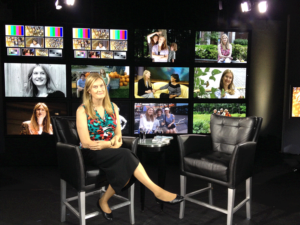 Fourteen podcasts and videos featuring Jenny B. holding forth about everything.
Fourteen podcasts and videos featuring Jenny B. holding forth about everything.Spring 2017 saw me travel from one end of the country to the other, talking about my literary thriller, LONG BLACK VEIL as well as other topics I hold dear: family, identity, and human rights. Along the way I taped a half dozen or more podcasts and other public talks, and I thought it might be helpful if I gathered them all in one place.
So here it is: Podcast Jubilee, featuring your old friend Jenny F. B. Enjoy!
• Out this week: the Barnes and Noble podcast with me and Miwa Messer
• The unsinkable Faith Salie (of Wait Wait Don’t Tell Me fame) and I talked about mystery and humor for Audible.
• Here’s the video of a conversation I had with Anna Quindlen and Susan Faludi on Feminism and Invention.
• I recorded “Where We’re Going and the Future of the Trans Movement in LA for LGBTQ&A. With Jeffrey Masters
• I interviewed Caitlyn Jenner at the 92nd Street Y on April 27, 2017.
• Read It Forward recorded this “Book Club Appetizer” for LONG BLACK VEIL.
• Over at Beaks n Geeks I talked about LBV and Literature as Resistance
• Richard Russo, my old friend, and I talked about the variables and constants in a writer’s life at WNYC’s Studio 360.
• At the Aspen Ideas Conference, I talked with Kristen Powers about Being a Transgender American.
• Here’s a talk about suspense and identity at the Open Book Event sponsored by Penguin.
• And finally, the amazing Susan Faludi and I sat down to talk about Long Black Veil, Feminism, and Identity. “Is identity the thing we create, or the thing we can’t escape?: A series of talks– start anywhere.
This one is about Long Black Veil.
This one is about love, romance & marriage.
This one is about trans experience.
This one is about ghost stories.
Enjoy!
Win a Free Copy of LONG BLACK VEIL
- by Jennifer Boylan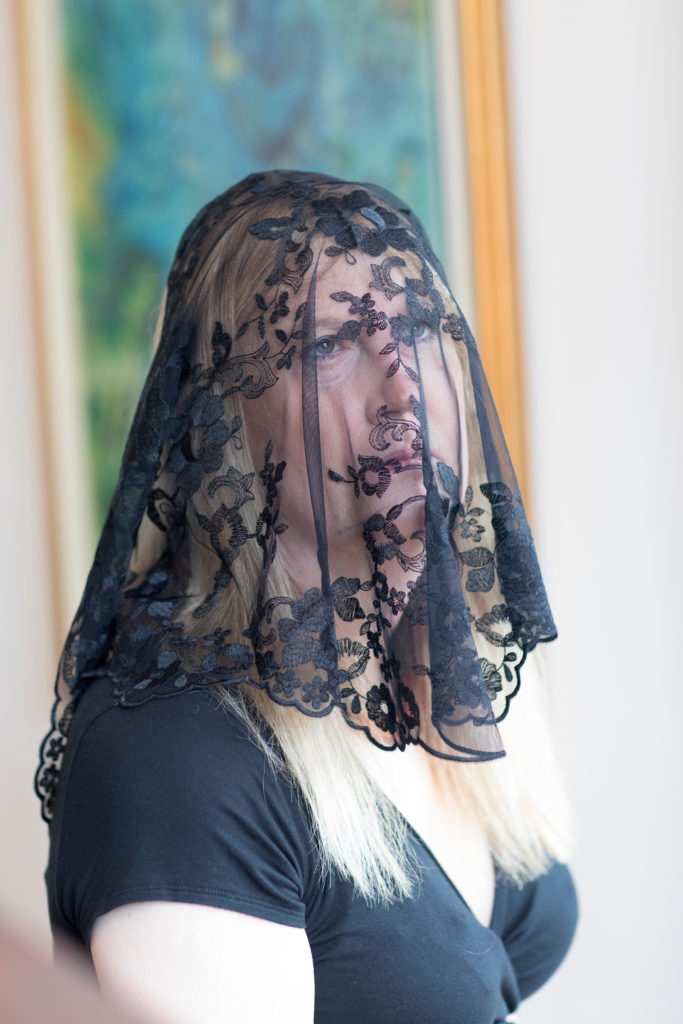
Jennifer Finney Boylan in New York, NY on Tuesday, March 28th, 2017. Photos by Jasmin Shah/Comer Family Foundation.
GET YOUR VEIL ON. My new novel, LONG BLACK VEIL, will be published on April 11, 2017– a literary thriller about identities– both hidden, and mistaken. To celebrate the day, I’ll be giving away 13 copies of the book– starting April 7 and going through the 20th.
What do you have to do to land yourself a copy? Take a photo of yourself doing one of two things: 1) wearing a Long Black Veil, or, 2) wearing a Little Black Dress. (Because I am guessing more of my readers have LBDs than LBVs). I am also willing to take a very creative view of what might constitute a veil. Or for that matter, a dress.
Post these up to Twitter using the hashtag #LongBlackVeil and each day I’ll pick the ones that are 1) the most lovely, or 2) the most gruesome, and if you’re the winner, bang, you’ve got yourself a book. It’d be good if you copied me as well, using @JennyBoylan
Worth playing for? I hope so. Take your photos and paste them up on Twitter and stay tuned– I’ll provide daily updates on my Twitter feed.
The book is a suspense novel that begins in an abandoned, ruined prison, where 6 old friends are goofing around. Things take a turn when they accidentally get locked in. And then just as swiftly find that behind those walls, they are not alone. LBV asks: what are the prisons we build for ourselves? And how do we get free? What do we owe the friends of our youth? Are we now the people we have been? And in any life that contains a before, and an after, how is it possible to live one life, not two?
Long Black Veil will also be available at bookstores nationwide, and I”ll be doing an extensive book tour in support of the novel. I hope to see you in weeks to come!
“If telling the truth were so easy, I bet it would be more popular.” — JFB in LBV. It’s a BFD!
Prick Up Your Ears
- by Jennifer Boylan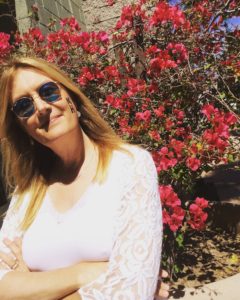 This is a speech I gave on the stage of the Haverford School in February 2017. My title for the talk was, “Prick Up Your Ears,” although the New York Times called this “Let’s Bring Back Moral Imagination.” In any case, this was quite a moment for me– because of course, I attended this school way back in the 1970s as a schoolboy (sic). It was the honor of my life to be asked to give the Hallowell lecture, which has in previous years been given by Norman Mailer, Mary Gordon, and Donald Hall. Edward Hallowell, after whom the lecture was named, was my teacher in 1975, a man who changed my life forever. He was sitting in the audience, and I sent this out to him–and to all teachers– with love.
This is a speech I gave on the stage of the Haverford School in February 2017. My title for the talk was, “Prick Up Your Ears,” although the New York Times called this “Let’s Bring Back Moral Imagination.” In any case, this was quite a moment for me– because of course, I attended this school way back in the 1970s as a schoolboy (sic). It was the honor of my life to be asked to give the Hallowell lecture, which has in previous years been given by Norman Mailer, Mary Gordon, and Donald Hall. Edward Hallowell, after whom the lecture was named, was my teacher in 1975, a man who changed my life forever. He was sitting in the audience, and I sent this out to him–and to all teachers– with love.NECN: “Next Chapter for Trans Pioneer.”
- by Jennifer Boylan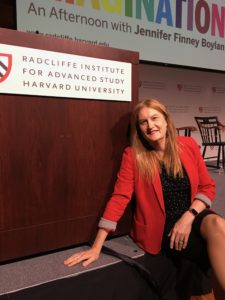 Here’s a cool interview I did with New England Cable News after my speech at the Radcliffe Institute of Harvard in February. “Pioneer” does make me sound like I’m driving a wagon train, though. Although who knows: maybe that’s a pretty good metaphor. Equality? Compassion? Justice? RAWHIDE! (whack!)
Here’s a cool interview I did with New England Cable News after my speech at the Radcliffe Institute of Harvard in February. “Pioneer” does make me sound like I’m driving a wagon train, though. Although who knows: maybe that’s a pretty good metaphor. Equality? Compassion? Justice? RAWHIDE! (whack!)JFB at Radcliffe Institute of Harvard U. on 2/16
- by Jennifer BoylanJoin me at Radcliffe on Thursday for a conversation about gender, politics, and imagination. Will post link to stream in a week or two as well.
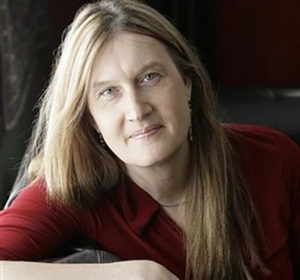
“From Hell to Breakfast”: JFB on Where We Are Now.
- by Jennifer Boylan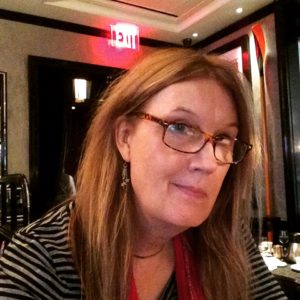
Professor Glasses awaits a martini. Ice cold. The drink, I mean.
Here’s an interview in advance of my visit to Humboldt State University next week, in which I say, “Take my hand. Don’t let go. Don’t you dare let go.”
Author Evening with JFB for PEN–please join me!
- by Jennifer BoylanPEN is hosting a literary dinner for me at the house of one Ruth Messinger in New York on 2/28/16. It’s a fundraiser, so bring your wallet. But a good cause. More info available here
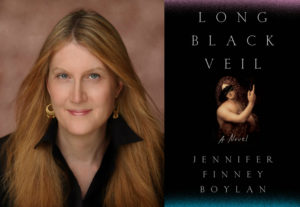
I Saw Three Ships
- by Jennifer Boylan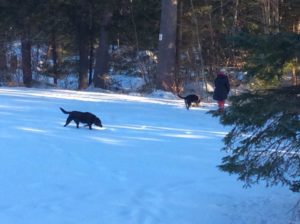 Early Christmas morning I saw deedie and the dogs out the window as the sun rose over the lake. And I pointed my camera out the kitchen window like this, and went Click.
Early Christmas morning I saw deedie and the dogs out the window as the sun rose over the lake. And I pointed my camera out the kitchen window like this, and went Click.President Obama told us, the day after the election, “The sun will rise.” And of course it has, and does.
I’m here in the Maine house having Christmas with my family, feeling lucky. But I know from reading other folks’ feeds exactly how hard holidays are for so many of my friends.
I hope that the light that shines on me will shine on everyone in days to come.
I’ll spare everyone my sense of faith. Let’s just say I think we should all love each other, and forgive one another. And yeah, I think those are about the hardest things to be asked to do, ever.
Deedie gave me a gold chain for Xmas, which I am now wearing. And warm socks and warm shirts and the Houghton Mifflin Best American Short Stories 2016.
I sang a few songs today. I jammed Do You Hear What I Hear into Cold Rain and Snow. I sang Arthur McBride and the Recruiting Sergeant (“I’ll cut off your head Christmas morning!”). I sang “happy Christmas/War is Over” and started to cry mid-chorus because I was thinking about a friend of mine who died this week, my surrogate father in law, David Busby. A man who liked to be in the center of a room quietly conducting the conversation with insight and with grace.
Later Seannie sat down at the keys and played “Comfortably Numb.”
I made a big-ass Xmas breakfast with scrapple and bacon and ham and fresh bread and minty potatoes I roasted yesterday and scrambled eggs. My sisters family FaceTimed us from England and I saw all my wonderful nephews and nieces now all adults. I took a long walk alone in the snow with the dogs, just looking at the cold quiet all around. The dogs paused before some tracks leading into the woods, but I pulled them back.
I wish I could stand between the people I know and love and all the hurt of the world. But I can’t. I can sing a few songs and make scrapple and try to be an instrument for the love of God. But sometimes I am just a big dufus.
My brother Todd Finney reminded me that the word for “Word” in Genesis also means “Story.” Which means that that book also might begin, “In the beginning was the Story.” If so, the story is still going on, and we are part of it. And some parts of this story are full of tears. And some parts are full of rising suns, young people singing songs, a quiet world with new snow, and hideous scrapple frying up in a skillet.
As I walked down our silent road, I heard a neighbor bang on the window and I looked over and he waved. I couldn’t hear him but I knew what he was saying.
Glory to god in the highest, and on earth, peace. Good will toward men. And women. And every one of you.
Couples in transition wanted for a TV show
- by Jennifer Boylan Greetings. This is a call out to couples currently in a relationship in which one member of the couple is trans, and expecting to begin transition soon. I serve as an advisor to a television series that is hoping to find a handful of couples to participate in an ongoing series of programs on transition for couples. If you are interested in being part of this, please make yourself known to me by writing via jb@jenniferboylan.net. I will put you in touch with the producers.
Greetings. This is a call out to couples currently in a relationship in which one member of the couple is trans, and expecting to begin transition soon. I serve as an advisor to a television series that is hoping to find a handful of couples to participate in an ongoing series of programs on transition for couples. If you are interested in being part of this, please make yourself known to me by writing via jb@jenniferboylan.net. I will put you in touch with the producers.I will share with you the request that the producers have made to me for casting: “we need married couples who currently present as a heterosexual couple. The trans individual must have already told their spouse that they identify as trans (since we need to interview both of them), but ideally, it should be a fairly new revelation.”
If you’re anything like me, you’ll feel a swiftly-developing sense of disappointment that the casting relies so heartily at first on hetero couples, and that transition is defined so narrowly. I am using my influence as best I can to bend the show in the direction of something more diverse and less binary. In the meantime, however, the request from the producers is what it is, and I am only a counsellor to this show, not the person or the network making it. If you want to proceed, let me know and I will put you in touch with them directly and you can make your own choices, preferably with your eyes wide open.
Sound fair? Let me know.
A Letter to the Trans Community and its Allies, 11/9/16
- by Jennifer BoylanA LETTER TO THE TRANS COMMUNITY AND OUR ALLIES, 11/9/16:

Dawn is breaking everywhere. Light a candle, curse the glare.
Dear friends: For a few brief moments this morning, I was convinced it was all a dream. President Trump? Surely this was just the residue of some strange half-baked nightmare.
But, of course, it was no fever dream. President Trump, and all the people who voted for him, is the new reality.
I admit I spent an hour or two this morning staring out the window at the bleak bare trees here in Maine, feeling more than a little creeping despair. It’s a hard day—for me, for my family, for all of us.
But on days like this people turn to allies and advocates for guidance. They turn to us for solace, and hope, and for our shared commitment to equality and love and inclusion—a commitment that cannot and will not be diminished by the events of last night.
More than ever, our community needs all of us to fight. They need us to continue to find allies even within a hostile Congress and Administration. They need us to stand up for the people that now– more than ever– fear they have no voice. They need for us to be brave, and to redouble our efforts to create a better future.
And so this morning I wanted to share with you all my belief that this is not the end of anything, but a beginning: a time of even greater devotion to our fight, a time to stand up for what we all know to be good and true.
On her way out the door to her social work job this morning, my wife Deedie was saying, “I love you,” when her throat closed up and she sat down, her eyes filling with tears. We held each other for a while. And then she said, “Well. At least we still have each other.”
Let this be true for all of us in this fight. We still have each other. And people in our community still have us.
In 1980, when he was defeated in his own bid for the Presidency, Senator Kennedy said, “For all those whose cares have been our concern, the work goes on, the cause endures, the hope still lives, and the dream shall never die.”
Our dream continues as well. Today, we get back to work, with hope, and humor, and love.
Sincerely,
Jennifer Finney Boylan
Pre-heat party for upcoming LONG BLACK VEIL
- by Jennifer BoylanWalking the Earth
• October 27, 2016/Belgrade Lakes, Maine •
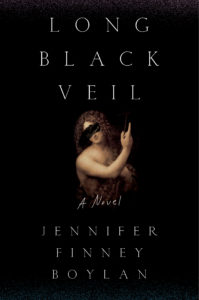 I’m back home after a few days walking the earth. I was in New York earlier this week talking to reviewers, bloggers, and media folks in what they call a “pre-heat” for my spring novel, LONG BLACK VEIL. This story of suspense, disappearance, murder, and changing identities begins in 1980, where six friends from college are goofing around inside Philadelphia’s abandoned and ruined Eastern State Penitentiary. Things get ugly when they accidentally get locked in– and also find that behind those walls they are not alone. The day ends in a disappearance, and a presumed murder. That’s chapter one.
I’m back home after a few days walking the earth. I was in New York earlier this week talking to reviewers, bloggers, and media folks in what they call a “pre-heat” for my spring novel, LONG BLACK VEIL. This story of suspense, disappearance, murder, and changing identities begins in 1980, where six friends from college are goofing around inside Philadelphia’s abandoned and ruined Eastern State Penitentiary. Things get ugly when they accidentally get locked in– and also find that behind those walls they are not alone. The day ends in a disappearance, and a presumed murder. That’s chapter one.I love the cover, which shows a defaced John the Baptist by Leonardo. John the B is a transfigured soul, male and female, earthly and heaven bound. Wait, did I say transfigured? I love that people will look at the cover and think,
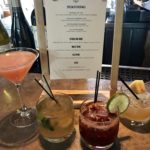
The drinks menu.
Say, is that a man or a woman? And I go, Hmmmm…
My publishers (whom I will always think of as Random Penguins) invented a cocktail for the book party, the Long Blackberry Veil. I also got to see my editor, Lindsay Sagnette
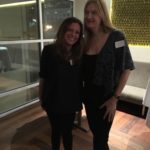
My editor, Lindsay Sagnette.
(also the editor of Gone Girl, among other books) and my publicist, Rachel Rokicki, who has worked on every single one of my books since She’s Not There.
After 3 days in the city I flew to Portland ME for a reading at Longfellow Books for the Bitch is Back anthology. I got momentarily teary at the podium, the way I do. Then I jumped in the car and drove the hour and a half home, where I found the dogs asleep and my wife Deirdre Grace awake. I ate chili in bed and watched the last two innings of the World Series.
The colors of autumn are on the fade up here. But deep within my heart there dwells an invincible summer. What about you? How are you doing? Are you all right? Won’t you be glad when the election is over?
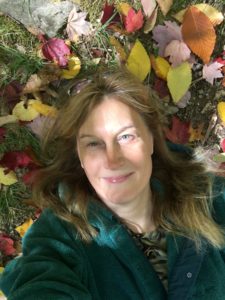
New Falcon Quinn Book Supports Anti-bullying Work
- by Jennifer Boylan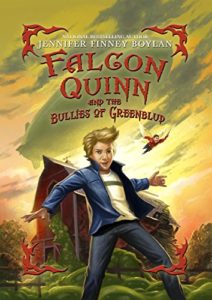 MONSTER UP with Falcon Quinn and the Bullies of Greenblud, just published! All proceeds benefit Spirit Day 2016 and GLAAD’s anti-bullying programs.
MONSTER UP with Falcon Quinn and the Bullies of Greenblud, just published! All proceeds benefit Spirit Day 2016 and GLAAD’s anti-bullying programs.It’s available as a Kindle book here— and it’s also available as a paperback here.
Falcon Quinn and his friends are monsters–a Sasquatch, a Chupakabra, a wind elemental, a Frankenstein– but now they confront the scariest challenge of all: 9th grade. Disguised as humans, Falcon and friends are in a race against time to find five monsters hidden in a New Hampshire high school. An exciting adventure as well as a serious look at what it means to be different– Falcon Quinn and the Bullies of Greenblud is a hilarious, moving look at bullies and the bullied, at monsters and humans, at boys and girls–and adults–of all kinds.
You can learn more about Falcon Quinn at the FQ Home page.
In the meantime, you must resist your monster nature. You don’t want to be a monster. Do you?
MONSTER UP!
Hot Flash: What Would You Do to Prove Your Love?
- by Jennifer BoylanOr: Is it hot in here, or is it just me?
via GIPHY
It was the third time we’d been through menopause, the two of us, and by now we were sick of it.
My first time, ten years ago, we’d been caught off guard. I woke in the middle of the night, drenched in sweat. During the daytime, I complained angrily about the sudden changes in the house’s temperature. “Don’t we ever change the batteries in this thing?” I said, meaning the thermostat.
“It says sixty-eight,” said Deedie, my partner, with a voice that suggested, not unreasonably, that the problem was all in my head.
I was forty-five then, and I’d only been female for a couple years. I knew that transition for transsexual women meant an ongoing experiment in endocrinology, that the ingestion of serious quantities of Premarin and Spironolactone would have dramatic changes upon my body. I had, of course, looked forward to those changes hungrily, had desperately, passionately, longed for them for most of my life.
When people asked me what the combined effects of the estrogen and the testosterone suppressant were, I’d cleverly say, “The one pill make you want to eat salad and talk about relationships. The other pill makes you dislike the Three Stooges.”It had also given me breasts and hips, softened my hair and skin. Which was, you know. Nice.
We’d weathered the transition together, Deedie and I. Then…
a href=”https://medium.com/@jennyboylan_97964/hot-flash-c74dc108b8ee#.x3u2bifcg”>(read the rest of the piece at Medium)Why Third Party Candidates Are Like Having Raccoons Live in Your Chimney
- by Jennifer Boylan
The thing about third party candidates is that, like love affairs, they are not unlike having raccoons in your chimney.I began my romantic life as a Republican, a long time ago, back when there were Rockefellers and Nixons, politicians who — crooks though they might have been — were still in many ways to the left of the current Democratic party. In college, however, I flipped over to the Democratic “lifestyle” — first behind my parents’ back, in secret, but by my senior year, openly, and without shame. I was all cued up to slip a ring on Jimmy Carter in 1980, but then along came Jon Anderson of Illinois, and I fell, hard. I knew it was wrong. But I was young, and…..
Where did the Orlando shooter learn his hate? Hint: It wasn’t Osama bin Laden.
- by Jennifer BoylanThe Source of
 Home-grown Terror
Home-grown TerrorJennifer Finney Boylan
Donald Trump wasted no time. “Is President Obama going to finally mention the words radical Islamic terrorism? If he doesn’t he should immediately resign in disgrace!”
This was early on Sunday, as the country was waking up to learn about the massacre in Orlando. Fifty people dancing at “Latin night” at a gay nightclub, The Pulse, had been killed by shooter who, at that hour, had not yet been identified.
The facts weren’t all in then, and are even now still being revealed. But it wasn’t too early for Donald Trump to decide on the source for this tragedy. “I called it,” he tweeted, referring to his pledge to temporarily ban Muslims from entering the country.
There are a lot of threads in this story: gun rights, terrorism, ISIS, Latino and Latina identity, immigration, and the endless and execrable campaign of 2016. It is hard to understand this catastrophe without taking the time to understand how all these forces intersect. The weeks ahead will give us the chance to learn more.
But one thing seems clear already. Omar Mateen didn’t learn his hatred of LGBT people from a distant cell of terrorists in Syria. He learned it on American soil.
This was no foreign born terrorist who furtively snuck over the border, like those Mexican “criminals, drug dealers, and rapists” Trump has mentioned. This was a man born in New York, raised in this country. Whatever he is, he is the product of our own culture.
We know that Mateen had been married, for a year, and that the marriage was marked by violence and abuse. But we also know that he had used an app called Jack’d, a dating site for men. He’d once proposed meeting a gay man for a drink at Pulse, the very club where he would later commit his atrocity.
One possible narrative of this tragedy is that it was committed by a man who was attracted to other men, and who found it impossible to accept the truth of what was in his heart. So instead he decided to destroy what was in himself, by lashing out at his brothers and sisters, to destroy the lives of people living with an absence of shame that he could not imagine for himself.
This was a man who had learned that it is better to commit mass murder—and suicide—than to accept oneself. This was a man who had learned that the lives of gay and lesbian and bi and trans people are expendable, that his own life, if he was one of us, was not worth living.
From whom did he learn this lesson? Did terrorists in Syria send him telegrams? Did the Taliban reach him by phone?
Of course not. He learned hatred of LGBT people, and of himself, right here at home.
He learned it from a county in which 200 anti LGBT bills have been introduced in the last six months.
He learned it in a country in which legislators have approved bills making it legal for any business not to approve services for marriages on the basis of religious objection.
He learned it from a country in which in one state, people with female anatomy and appearance are legally required to use the men’s room, because of what might appear on their birth certificates.
He learned it from a country in which, in another state, mental health professionals are permitted, if they so choose, to refuse services to gay people.
He learned it from a country in which people like me, and families like mine, are blithely referred to as “abominations.”
He learned it from a country in which the Lieutenant Governor of Texas—the second highest elected official in our second largest state—responded to the tragedy in Orlando by posting the message on Twitter: “God cannot be mocked. A man reaps what he sows.”
He learned it from a country in which more than a third of transgender people have attempted to take their own lives. One such victim, seventeen year old Leelah Alcorn, threw herself in front of a truck last year rather than live in this culture. “Fix society,” she wrote in her suicide note.
The society Alcorn wanted fixed is not the society of the Taliban in the mountains of Pakistan. The society Alcorn wanted fixed is not the society of the Islamic State. It was the society of her home town of Kings Mills, Ohio, a state that has no protections for sexual orientation or gender identity outside of state employment.
It was the society of Orlando, Florida, where a person who survived the massacre at the Pulse on Saturday night can be legally fired on Monday morning for being gay.
On Sunday, just hours after the Orlando shooting, a twenty year old Indiana Man, James Wesley Howell, was arrested in California with an arsenal of weapons he apparently intended to use on an attack on the Los Angeles Pride celebration. His car contained three assault rifles, high capacity magazines, ammunition, and a five gallon bucket containing chemicals.
From whom did Howell learn his hatred? Hint: It wasn’t Osama bin Laden.
We cannot create a more loving and compassionate country by sealing our borders. Hatred of people like me, and of my family, does not come from overseas.
The fault is not in our stars. It is in ourselves.
Contact
For appearances (related to GOOD BOY, dogs & gender): Christine Mykithyshyn at Macmillan Publicity:)
christine.mykityshyn@celadonbooks.com
For appearances (related to She’s Not There, Long Black Veil, She’s Not There, I’m Looking Through You, Stuck in the Middle With You, Long Black Veil, and/or other gender, human rights & education issues:)
Kathryn Santora at Penguin Random House:
ksantora@penguinrandomhouse.com
For press inquires:
Kris Dahl at ICM
KDahl@icmpartne
To contact Jenny directly:
jb@jenniferbo

